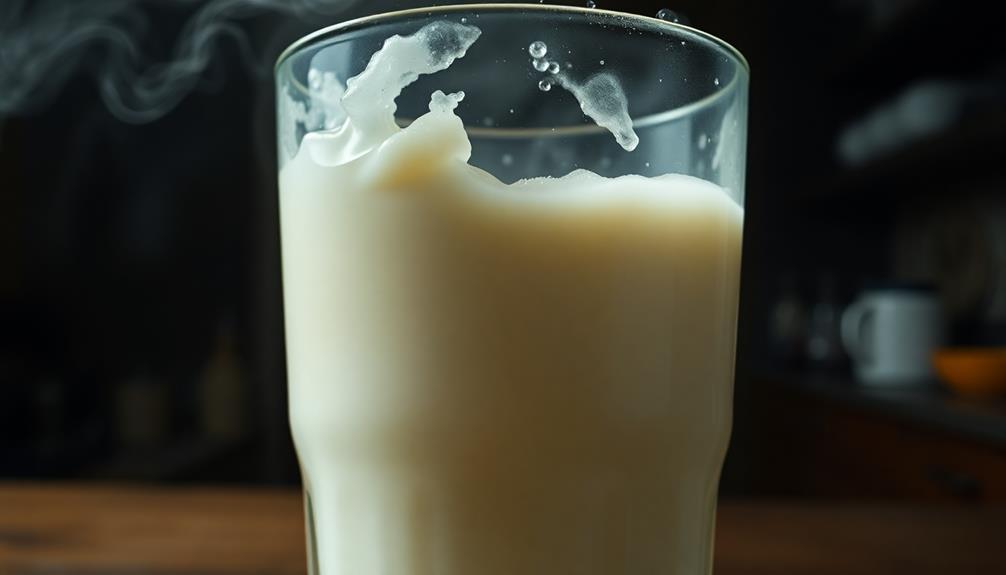Bad milk smells strong and sour, almost like rotting fruit. When milk spoils, bacteria produce lactic acid, which gives it that sharp odor. Fresh milk usually has a clean, neutral scent, but once it starts to smell off, it's a sure sign you should toss it. If you heat spoiled milk, the stench only gets worse! Trust your nose; if it smells unpleasant, it's better to be safe and throw it away to avoid any health risks. Knowing what to look for is important for your safety, and there's always more to discover about milk and its journey!
Key Takeaways
- Bad milk emits a strong, sour smell caused by lactic acid produced during bacterial spoilage.
- Fresh milk has a clean, neutral scent, while spoiled milk has a pungent, sharp odor.
- Heating spoiled milk intensifies its foul smell, making it more noticeable.
- Any noticeable off-odor in milk serves as a clear warning sign of spoilage.
- Regularly check for unpleasant odors in milk to ensure safety and avoid health risks.
Introduction
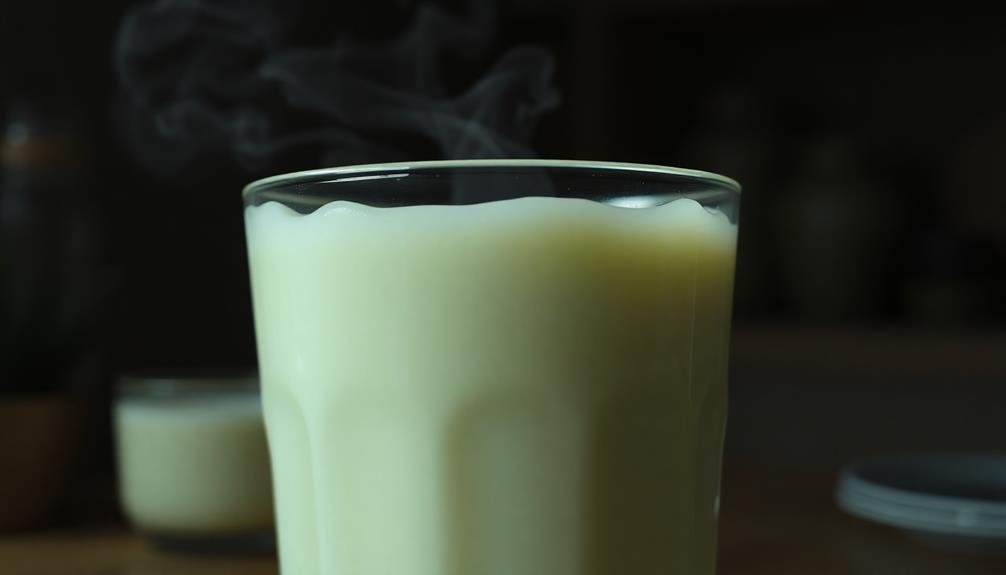
When you open a carton of milk, the last thing you want is to be hit by a strong, unpleasant odor. That sour smell can signal trouble, indicating your milk might be spoiled. Spoiled milk happens when bacteria start to grow, causing fermentation. This process produces lactic acid and other volatile compounds that create that awful smell.
Regularly checking the freshness of food items, like milk, is essential for avoiding spoilage and potential health risks, much like the need for air purifier maintenance. Fresh milk, on the other hand, has little to no odor, which is a good sign that it's still good to drink.
You might notice that even before tasting, that acidic smell can tell you something's off. If you heat up spoiled milk, the unpleasant odor can become even stronger! And trust me, drinking milk that smells bad can lead to foodborne illnesses, so it's best to avoid it.
Keep in mind that your sense of smell is a powerful tool. It helps you determine if your milk is fresh or spoiled. Next time you pour a glass, take a moment to sniff.
Description of the Smell
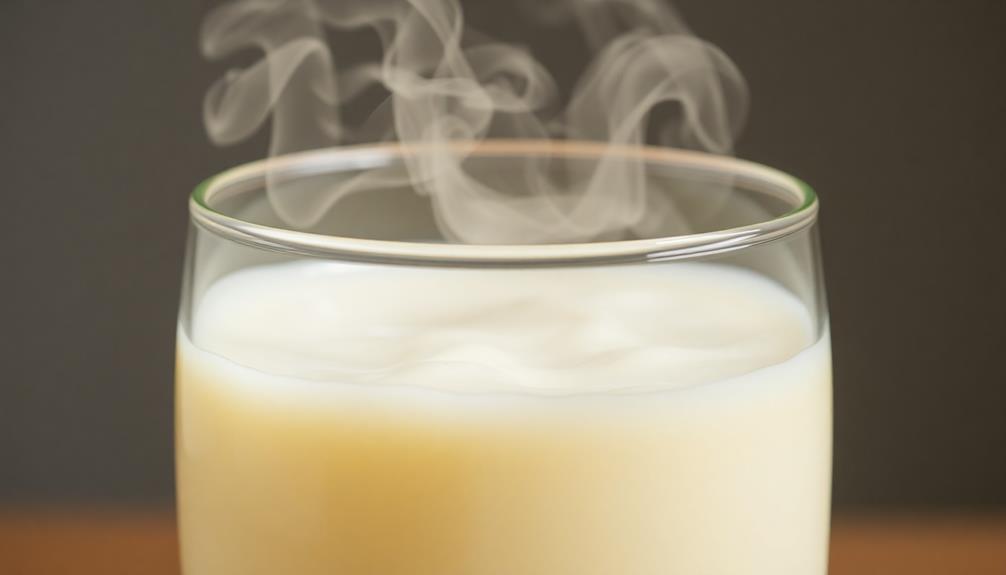
The smell of bad milk is unmistakable and can be quite intense. When you catch a whiff of spoiled milk, you'll likely notice a strong, sour smell that makes your nose wrinkle. This odor comes from lactic acid produced during bacterial fermentation.
Fresh milk has little to no odor, but as spoilage sets in, the scent changes dramatically, becoming pungent and sharp. You might even detect hints of rancid or off-putting notes, signaling that bacteria have taken over.
If you happen to heat up that bad milk, the foul odor becomes even more pronounced, making it hard to ignore. Any noticeable sour or off-odor is a clear warning sign that the milk has gone bad.
It's important to pay attention to these scents because spoiled milk not only has an unpleasant taste but can also pose safety risks if consumed.
Source and Composition
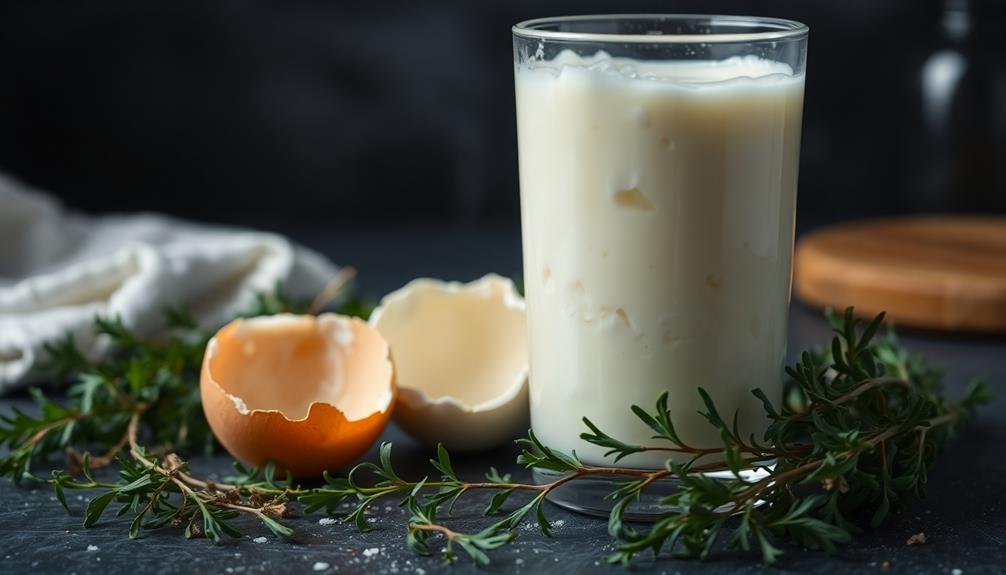
Bad milk's unpleasant smell primarily stems from the activity of bacteria that thrive in it. When milk spoils, spoilage bacteria like Lactococcus lactis and Lactobacillus species go to work, munching on lactose. As they do, they produce lactic acid, which contributes to that sour smell you might notice.
Along with lactic acid, these bacteria release other volatile compounds, such as acetaldehyde and diacetyl, which add to the rancid odor of bad milk. This microbial action is somewhat similar to how certain foods in a raw food diet can provide a different set of smells and flavors, highlighting the importance of freshness in food.
As the milk's chemical composition changes, you'll find that its scent can become more pungent, even reminding you of something rotten. The intensity and type of odor depend on the specific bacterial strains present and how the milk was stored.
If conditions are just right for these bacteria, the smell can become particularly strong and uninviting.
In short, the next time you encounter bad milk, remember that it's all about the bacteria doing their thing, transforming fresh milk into a smelly mess! So, keep an eye (or nose) on your milk to avoid any unexpected surprises in your fridge!
Typical Scenarios or Environments
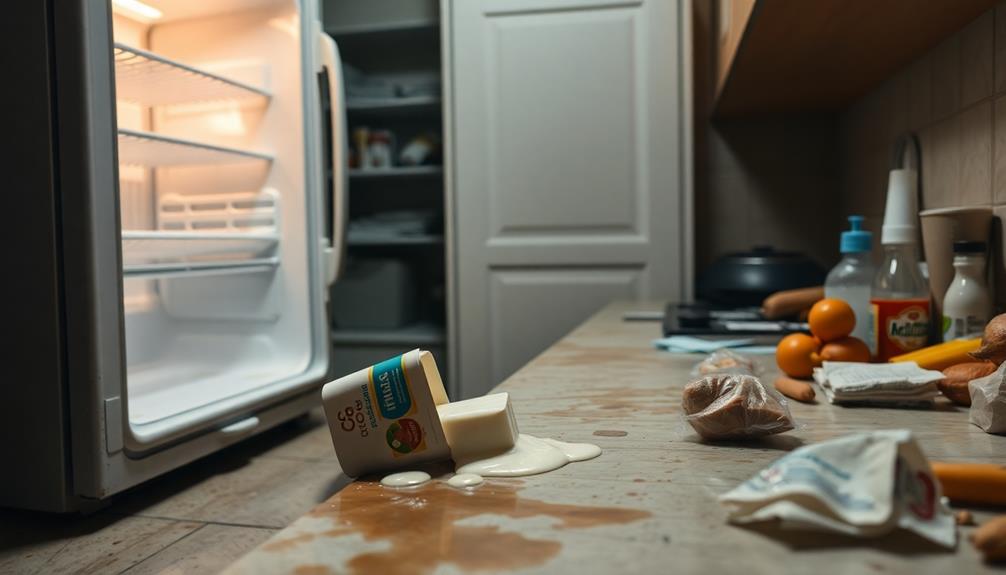
Spoiled milk often surfaces in everyday situations where proper storage isn't prioritized. You might find bad milk in your fridge after leaving an opened container out too long or when it's past its expiration date.
When milk isn't refrigerated correctly, environmental factors like higher temperatures can speed up bacterial growth, similar to how air purifiers for allergies and pet owners help mitigate indoor allergens. This leads to a strong, unpleasant odor that can knock you off your feet!
Imagine reaching for a glass of milk, only to be met with a sourness that hints at rancidity. That nasty smell comes from lactic acid and other compounds produced by hungry bacteria.
If you take a quick whiff from the container, fresh milk should smell clean and neutral, while bad milk will have a distinctly off-odor, resembling something rotten.
To avoid this situation, always check the expiration dates on your milk and store it in a consistently cold part of your refrigerator. Keeping milk properly refrigerated helps prevent the growth of those pesky bacteria and keeps your milk smelling fresh.
Emotional or Cultural Associations
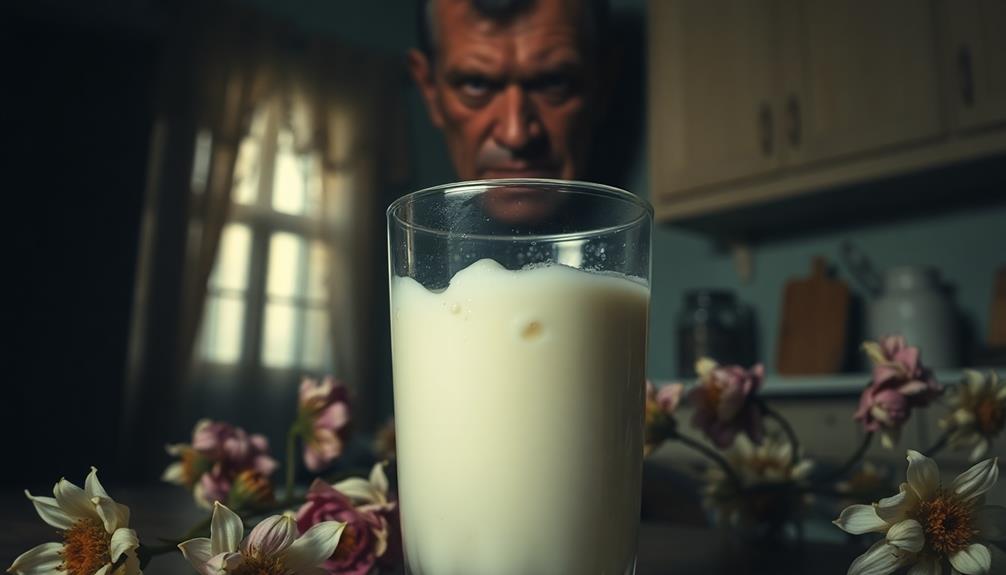
Milk's unpleasant odor can evoke strong emotional reactions, often rooted in our instinctual aversion to spoilage and potential foodborne illness. When you catch a whiff of spoiled milk, it's not just the smell that gets you; it can trigger feelings of disgust and nausea. This distaste is universal, reminding you of the dangers that come with decay and neglect in food storage.
Culturally, the scent of bad milk might stir memories of wastefulness, especially in communities that rely heavily on dairy. Imagine families disappointed when their milk goes bad, emphasizing the importance of proper refrigeration.
This unpleasant odor symbolizes more than just spoiled food; it can represent broader themes of decay and decline. In literature and art, bad milk's smell can metaphorically reflect loss or deterioration, making it a powerful symbol.
Health or Safety Considerations

The unpleasant odor you encounter often signals more than just a bad smell; it can indicate serious health risks. When milk smells sour or rancid, it's usually a sign of spoilage due to significant bacterial growth.
These bacteria produce off-smells that can warn you about potential foodborne illnesses. Consuming milk with an unpleasant odor isn't just unappetizing; it can lead to gastrointestinal issues like nausea, vomiting, and diarrhea, especially for children and the elderly who are more vulnerable.
To keep yourself safe, regularly checking for those off-smells in your milk is essential. Fresh milk should have little to no odor, while bad milk can send out a pungent smell that you might even catch from afar.
If you notice an unpleasant odor, it's best to toss the milk and avoid any health risks.
Final Thoughts
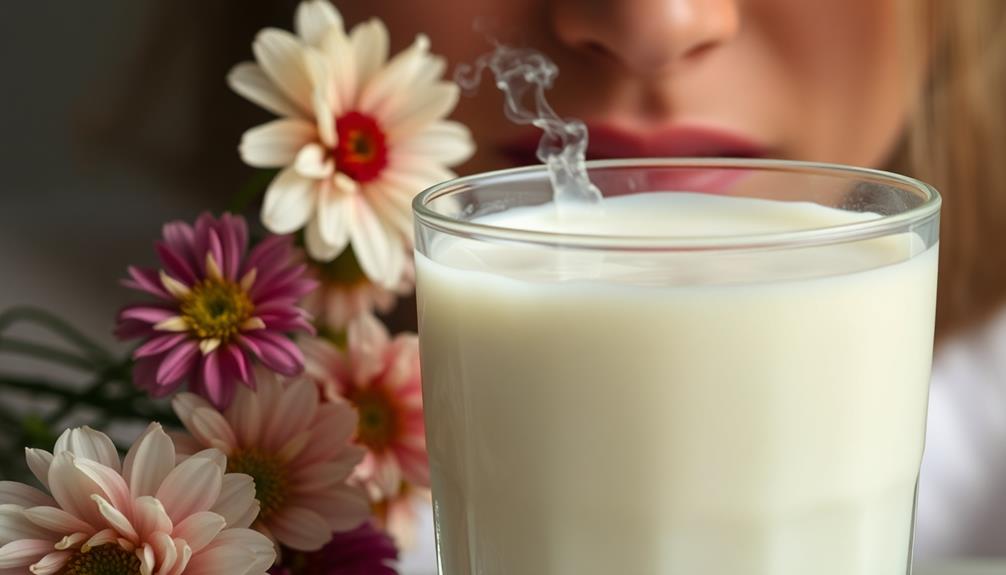
When it comes to dairy products, knowing how to identify bad milk can save you from unpleasant experiences and health risks. The smell of bad milk is a clear sign of spoilage, often giving off a strong, unpleasant odor that can be described as rancid or sour. This sourness comes from lactic acid, produced when bacteria break down lactose.
If you notice this foul smell, especially after heating the milk, it's best to discard it immediately. Fresh milk should have little to no odor, so a strong, sour scent is an indicator that it's no longer safe for consumption. Ignoring these signs can lead to gastrointestinal issues or even foodborne illnesses, which you definitely want to avoid!
Always trust your senses. If your milk smells off, it's wise to err on the side of caution. Your health is worth more than a little waste. By learning to recognize bad milk, you can enjoy your dairy products safely.
Frequently Asked Questions
Can You Tell if Milk Is Bad by Smell?
You can definitely tell if milk's bad by smell. Fresh milk usually has little odor, but if it smells sour or rancid, it's likely spoiled. Trust your nose; it's a reliable indicator of freshness.
What Happens if I Drink Spoiled Milk?
If you drink spoiled milk, you might experience nausea, vomiting, or diarrhea. Even a small amount can upset your stomach, especially if you're sensitive. It's best to avoid it altogether to prevent discomfort.
Can You Drink Milk That Smells a Little?
If milk smells a little, you might still consider using it. Just check for other signs like curdling or color changes. If it seems safe, it's okay for cooking, but be cautious consuming it directly.
Why Does My Milk Smell Bad but It's Not Expired?
If your milk smells bad but isn't expired, it's likely due to improper storage or contamination. Bacteria can grow even before the sell-by date, causing off-odors. Trust your senses; discard it if in doubt.
